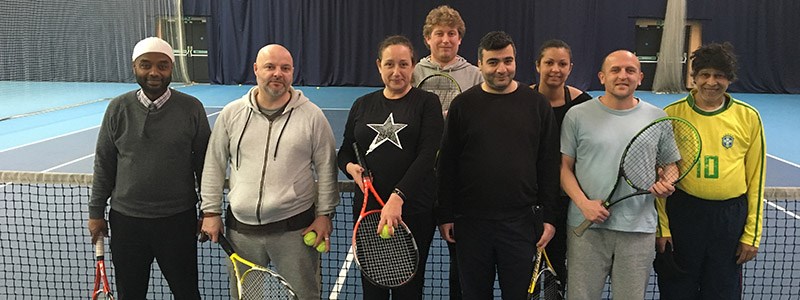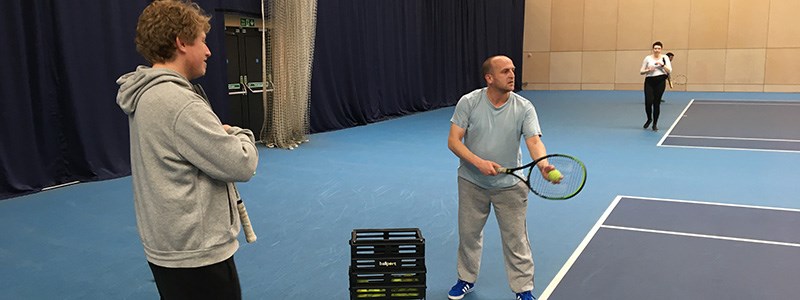
How a Lee Valley tennis project is tackling mental health issues
• 6 MINUTE READ
This week is Mental Health Awareness Week, and to mark it we are profiling the work of one LTA-supported project that is demonstrating how getting involved in playing tennis can have a positive impact on mental health issues.
The power of sport really can be a magical thing – and it is something Jack Pringle, a Sports Development Officer at Lee Valley Regional Park, has witnessed firsthand through his involvement in a mental health tennis programme being run at Lee Valley Tennis Centre.
Across many walks of life, in all four corners of the earth, people will turn to sport. For some it’s a job, for some it’s a hobby. For many, it can simply provide a release or an escape route.
That’s something that Jack has realised during his career in sports development, and even more so over the past four years since the mental health tennis programme was established.
Lee Valley is one of a growing number of communities across the country where the LTA is harnessing that power of sport to change lives by supporting tennis programmes that specifically help to improve mental health issues.
And like elsewhere, the Lee Valley sessions have proved to be a huge success.
Starting out in 2015, what was originally a short-term course has developed into something much bigger that continues to have an impact on the people that take part.
Jack is delighted with how things have gone, saying: “It’s the first type of programme that we had run like this, with the aim of providing opportunities for more people with mental health issues to come along to Lee Valley and enjoy some tennis with our qualified coaches.
“We initially ran a 12-week programme which proved to be a success, so we decided to look at running more long-term programmes with the participants that had been involved.
The biggest success is the impact we’ve been able to make on the lives of those people involved.
“Since the programme started in February 2015, we’ve had nearly 100 unique participants, we probably average 12 players a week. For me, what’s been the biggest success is the impact we’ve been able to make on the lives of those people involved.”
While increasing numbers are fantastic to see, it’s that impact Jack mentions which is the real reward he sees from being involved in such programmes.
Obtaining feedback from members, the results have been positive across the board. Participants unanimously agree that the sessions gave their day structure, a routine — something so important to those dealing with mental health issues. Boosted confidence, improved sleeping patterns and a healthy appetite were among the other benefits reported back from the evaluation forms distributed.
There are more success stories beyond health improvements too, with several players taking their love of tennis even further. Two have volunteered at Wimbledon, three for the ATP World Tour Finals at the O2, and four for the Wheelchair Tennis Masters when it was held at the Lee Valley Hockey & Tennis Centre. One participant went on to work as an assistant tennis coach after obtaining an NVQ; others are competing in local leagues.
“Feedback showed 60 percent of players now also play outside of this weekly session on the back of friendships developed through the group, so they’re more physically active as a result of their decision to get involved with us.
“Some had played tennis when they were younger and decided to give it another go. For others it was a first-time experience, so the ability range varies considerably. Some do it to get out, get some fresh air and a bit of exercise, some want to improve their game, some want to compete.

As evidence of the real impact using tennis as a tool in this way can have, one of the biggest outcomes of the programme can be seen not on the court, but in GP surgeries.
“One of the most powerful achievements is 100 per cent of members now only visit their GP for organised mental health check-ups, and only visit every three to six months”, Jack says.
“Prior to the programme, members were seeing their GPs for slight aches and pains, if they were feeling slightly unwell and often just as an opportunity to socialise, which is obviously a burden on the NHS.
“Research we’ve done indicates that GPs often don’t take those patients as seriously if they’re coming so often — they don’t think they’ve got as many problems as they might suggest. Statistics suggest that suicide rates as a result of mental health issues would be down if patients only visited their GP when in crisis.
“It fully justifies why we’re running the programme. I wouldn’t say we were striving for that outcome at the start, but we were aware of the powers of sport and the impact that can have on the lives of those involved.
“Until you run a programme like this and receive that feedback, you don’t realise the impact that you can make.”
The Lee Valley tennis sessions are part of a wider programme of activity delivered by Core Sport, an East London based charity. Earlier this year they picked up the Mental Health Award at the Sport and Recreation Alliance’s Community Sport and Recreation Awards in recognition for their work in providing adults with mental health issues opportunities to engage in physical activity.
Get involved
Tennis is for everyone! Find out how you can get on court this summer by visiting our Play webpage.





